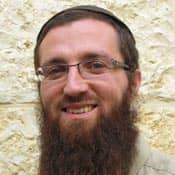A number of years ago, I was reading Stephen Covey's legendary work, The Seven Habits of Highly Effective People. Close to the beginning of the book, I was taken aback as I began to list off Torah sources in my head for the principles Covey was so eloquently laying out and explicating.
Upon further contemplation, it dawned on me that the fact that Covey's habits can be found in Torah sources should come as no surprise. After all, the Hebrew word Torah literally means "teachings for life"—what life is about and how to truly live it.
In a sense, we can say that the Torah is the world's original self-help book, which makes God the world's original life coach.
It was at the moment, when this realization struck me that I was inspired to write a self-help book based on Judaic sources. Gleaning from the Tanach, Rabbinic teaching, Chassidic works, and Kabbalistic writings, I wrote a clear and concise user-friendly manual. (It can be found here.)
Upon hearing the sad news of the passing of Stephen Covey a number of days ago, I felt compelled to write about his principles and where we can find them in Judaic sources.
HABIT 1: BE PROACTIVE
If we crack open the accepted code of Jewish law, the Shulchan Aruch, we find that the first thing the Jew is told to do in the morning is to "wake up like a lion." By waking up in a strong way and not hitting the snooze button, I make the statement that just as God is beyond the limits of time, I, too, can stretch those limits by assuming the attitude that I am not going to be "pushed around" by time. Rather, I will act with ferocious strength in my day's dealings.
To realize what you are and who you could be, and then proactively take your life into your hands is true personal power.
HABIT 2: BEGIN WITH THE END IN MIND
In Lecha Dodi, a well-known song sung by the Jewish people on Friday night as they bring in Shabbat, there is a line that states, "that which is last in action is first in thought." The point being made is that Shabbat was brought about last in the creation story testifiying that it was the ultimate purpose and goal of all of creation. In a sense we can say that God "began with the end in mind." Everything in the creation story is a contributing factor and leads up to the Shabbat experience since Shabbat is the day that is set aside for experiencing all that has been built up during the week.
HABIT 3: PUT FIRST THINGS FIRST
There is an idea in Kabbalah that many things in the world and body consist of a "main" and a "sub." The sub always comes to serve the purpose of the main and, in turn, assumes the identity of the main through its association with it. For example, eyelids are a sub to the eye. They serve the purpose of the eye though their protection of it and gain their identity through that role. Hence, we call them eyelids. The same principle can be applied to fingernails, orange peels, and many other things.
In each of these examples, what gives the sub its identity is not the object itself, but its designated purpose. Similarly, if we focus on our priorities in life as our "main" and our means to support ourselves as we strive to get there as our "sub," we can infuse all our sub activities with the meaningfulness of the main. If we put first things first and stay conscious of what we are shooting for and how the means will help us get there, the means themselves take on the meaningfulness of the ends. The result: we live a happier, more fulfilled life.
HABIT 4: THINK WIN-WIN
One foundational teaching in Kabbalah is that God looked into the Torah and created the world. Just as a builder builds a building based on that blueprint, so too, God "looked" into the spiritual concept of the Torah and created the world. The Torah is the "blueprint" of creation.
What I am saying here is that, in a sense, the world can be compared to a building. In a building everything has its place and its purpose. If something is out of place or not strong enough to fulfill the task allotted for it, the building as a whole is affected.
The same idea can be applied to the world.
Even though we are all individuals and we are all different, our individual actions do not affect only our individual selves. Rather, we are all interlocked, interdependent, and parts of the same whole with the same destiny. Therefore, we can say that the fabric of existence is "unified multiplicity"—multiplicity that is unified at its core. This results in a reality in which the effects of our actions are maximized, a reality in which what we do as individuals has universal consequences, and a world in which "win-win" is the only way to truly win.





